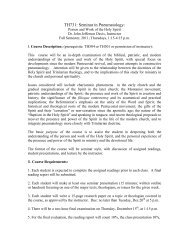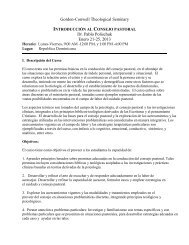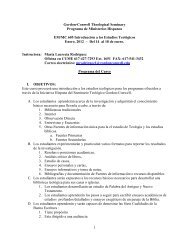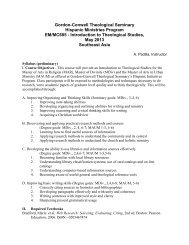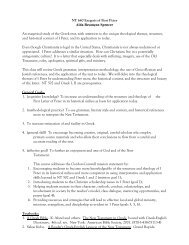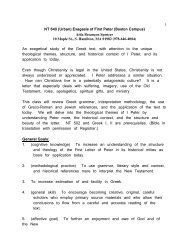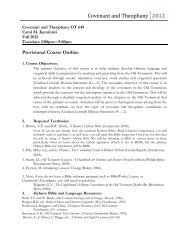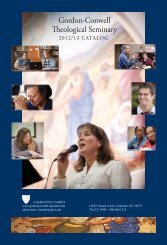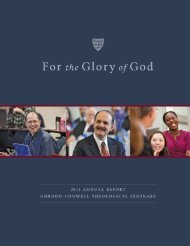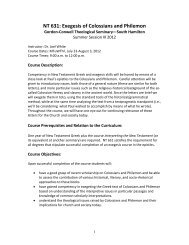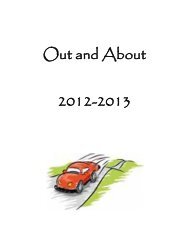1 TH607 Systematic Theology III1 Dr. Adonis Vidu avidu ...
1 TH607 Systematic Theology III1 Dr. Adonis Vidu avidu ...
1 TH607 Systematic Theology III1 Dr. Adonis Vidu avidu ...
You also want an ePaper? Increase the reach of your titles
YUMPU automatically turns print PDFs into web optimized ePapers that Google loves.
<strong>TH607</strong> <strong>Systematic</strong> <strong>Theology</strong> III 1<br />
<strong>Dr</strong>. <strong>Adonis</strong> <strong>Vidu</strong><br />
<strong>avidu</strong>@gordonconwell.edu<br />
Office: Library, 109<br />
Office Hours @ theologyofficehours.wordpress.com<br />
Course description<br />
<strong>TH607</strong> <strong>Systematic</strong> <strong>Theology</strong> III<br />
Syllabus<br />
Spring 2011<br />
<strong>TH607</strong> is the capstone of the systematic theology classes at Gordon-Conwell. As a<br />
result, I am very intentional about making it an integrative experience. The<br />
following doctrines are explicitly covered: Holy Spirit and spiritual gifts, salvation,<br />
church and sacraments, eschatology and final states. A very important objective of<br />
this class is to find the coherence between these doctrines and the rest of systematic<br />
theology, but also their significance for Christian life.<br />
The doctrine of the person and work of the Holy Spirit grounds the rest of the<br />
discussion of soteriology, ecclesiology, and eschatology. A specifically Trinitarian<br />
Pneumatology is determinative for one’s understanding of the work of the Holy<br />
Spirit. On the other hand, a Trinitarian Christology leads to overcoming some of the<br />
oppositions between ‘merely’ forensic and participationist understandings of<br />
salvation (justification and sanctification). Moving into the doctrine of the church, a<br />
robustly Trinitarian theology will be shown to mediate between highly<br />
individualistic and highly institutionalized ecclesiologies.<br />
We shall be reading three impressive theologians which are very much in<br />
conversation with each other. They each come from different Christian traditions.<br />
John Zizioulas is a contemporary Eastern Orthodox theologian whose book, Being as<br />
Communion is one of the most influential theological books of the last two decades<br />
or so. Miroslav Volf comes from within the Free Church tradition (Pentecostal) but<br />
he strongly reacts against its individualism. Finally, Michael Horton represents the<br />
Reformed tradition of Protestant theology. We shall engage in an immensely<br />
stimulating conversation with these three theologians.<br />
The format of the class includes lectures, but also class-wide debates, as well as<br />
small-group discussion and processing. The student should bring her or his personal<br />
1 This version is still provisional. A final and definitive version will be provided on<br />
the first day of class. Potential changes will not affect the required reading and the<br />
evaluation.<br />
1
Bible. Although these activities are not graded, all students are required to<br />
participate in them.<br />
Learning outcomes<br />
2<br />
• To understand the systematic coherence of pneumatology, soteriology,<br />
ecclesiology, and eschatology.<br />
• To understand the differences between major Christian confessions on the<br />
respective topics.<br />
• To understand what is at stake in various soteriologies, including their<br />
practical implications for the life of the church.<br />
• To gain a better understanding of the distinctive role played by the Holy<br />
Spirit in salvation and the life of the church.<br />
• To gain a sense for the importance and reality of the church and its<br />
implications for the life of the congregation.<br />
• To understand various ecclesiological assumptions made by the variety of<br />
worship styles and liturgical traditions.<br />
• To gain an appreciation for the importance of catechetical formation for the<br />
life of the church.<br />
• To understand the implications of each of these topics for the following<br />
areas: evangelism, worship, missions, discipleship etc.<br />
Course outline<br />
1. The person of the Holy Spirit<br />
a. Person of the Spirit<br />
b. Gifts of the Spirit<br />
2. The work of the Holy Spirit<br />
3. Calvinism v. Arminianism (or rather, the Work of the Spirit cont.)<br />
a. Predestination<br />
b. Calling<br />
c. Perseverance<br />
4. Justification<br />
a. The New Perspective debate<br />
b. Faith and works<br />
5. Union with Christ<br />
a. Eastern Orthodox Perspectives<br />
b. The New Finish Interpretation of Luther<br />
6. The being of the church
a. The marks of the church<br />
b. Where is the church?<br />
Mid-term exam: 19-20 March.<br />
7. Sacraments: Baptism<br />
a. Infant Baptism<br />
b. Credo-Baptism<br />
8. Sacraments: The Eucharist<br />
a. Transubstantiation<br />
b. Consubstantiation<br />
c. Symbolic/Anamnetic view<br />
9. Church Governance<br />
a. Communion vs. institution<br />
b. Models of organization<br />
c. Women’s ordination<br />
10. Eschatology and final states<br />
a. Millennial views<br />
b. Creation and New Creation<br />
c. Soul, death, and resurrection<br />
d. Universalism<br />
e. Intermediary states<br />
Evaluation<br />
• 30% Reading report. The student will have to report the percentage of the<br />
reading she has completed. Due by the last day of written work.<br />
• 20% Midterm exam. The student will have to respond to 2 essay questions<br />
out of three choices. The list of possible midterm essay questions will be<br />
supplied on the first day of class.<br />
• 20% Final exam. Exactly the same conditions as the Midterm.<br />
• 30% Personal statement of faith. This is a reflective exercise, covering all<br />
three systematic theology classes, in which the student integrates all the loci<br />
into a coherent statement of faith. While biblical references are required, it is<br />
preferable to avoid proof-texting and refer instead to wider biblical theology.<br />
Length: minimal 5-8 pages, at 1 ½ spacing (feel free to go as long as you<br />
need: this exercise is primarily for your benefit). My grading criteria include:<br />
o Comprehensiveness: The full extent of systematic theology should be<br />
covered. Ability to see connections between various doctrines.<br />
o Clarity: I prize both conceptual as well as literary clarity.<br />
3
Required Reading<br />
4<br />
o Foundation: The ability to demonstrate the biblical bases for<br />
particular theological positions.<br />
o Suggestions for reflection:<br />
� Ministry implications<br />
� How has your theological position changed<br />
� Your position in relation to your denominational affiliation<br />
Books<br />
• Veli Matti Karkkainnen, An Introduction to Ecclesiology: Ecumenical,<br />
Historical, and Global Perspectives (IVP, 2002, 0830826882)<br />
• Walter A. Elwell, ed., Evangelical Dictionary of <strong>Theology</strong> (Baker, 2001,<br />
0801020751)<br />
• Gerald Bray, God is Love (Crossway, 2012, 1433522691)<br />
• Anthony Thiselton, The Hermeneutics of Doctrine (Eerdmans, 2007,<br />
0802826814)<br />
• Graham McFarlane, Why Do You Believe What You Believe about the Holy<br />
Spirit? (Wipf&Stock, 2009, 1606086227)<br />
Articles and Excerpts<br />
• Max Turner, The Holy Spirit and Spiritual Gifts (Hendrickson, 1998, excerpts:<br />
‘Cessationism and the New Testament Expectation’; ‘Towards a Trinitarian<br />
Pneumatology’)<br />
• Michael S. Horton, People and Place (WJK, 2008, excerpt)<br />
• Graham McFarlane, Why do You Believe What You Believe about the Holy<br />
Spirit? (Wipf & Stock, 2009, excerpt)<br />
• Roger Olson, Arminian <strong>Theology</strong>: Myths and Realities (IVP, 2006, excerpt)<br />
Additional bibliography<br />
Bartos, Emil. Deification in Eastern Orthodox <strong>Theology</strong>. Paternoster, 2007.<br />
Braaten, Carl E., and Robert W. Jenson. Union with Christ: The New Finnish<br />
Interpretation of Luther. Wm. B. Eerdmans Publishing Company, 1998.<br />
Christensen, Michael J., and Jeffery A. Wittung. Partakers of the Divine Nature: The<br />
History and Development of Deification in the Christian Traditions. Pbk. Ed.<br />
Baker Academic, 2008.<br />
Clowney, Edmund. The Church: Contours of Christian <strong>Theology</strong>. InterVarsity Press,<br />
1995.<br />
Dawn, Marva. A Royal "Waste" of Time: The Splendor of Worshipping God and Being<br />
Church for the World. Wm. B. Eerdmans Publishing Company, 1999.
D'Costa, Gavin. <strong>Theology</strong> and Religious Pluralism: The Challenge of Other Religions.<br />
Blackwell Publishers, 1986.<br />
Dunn, James D. G. Baptism in the Holy Spirit: A Re-Examination of the New Testament<br />
Teaching on the Gift of the Spirit in Relation to Pentecostalism Today.<br />
Philadelphia: Westminster Press, 1970.<br />
Jensen, David H., eds.. The Lord and Giver of Life: Perspectives on Constructive<br />
Pneumatology. Westminster John Knox Press, 2008.<br />
Federation, Lutheran World, Roman Catholic Church, and Catholic Church. Joint<br />
Declaration on the Doctrine of Justification. Wm. B. Eerdmans Publishing<br />
Company, 2000.<br />
Frame, John M. Salvation Belongs to the Lord: An Introduction to <strong>Systematic</strong> <strong>Theology</strong>.<br />
P & R Publishing, 2006.<br />
Gaffin, Richard B., Jr. Perspectives on Pentecost. P & R Publishing, 1979.<br />
Green, Michael. I Believe In The Holy Spirit. Revised. Wm. B. Eerdmans Publishing<br />
Company, 2004.<br />
Grudem, Wayne A. The Gift of Prophecy in the New Testament and Today. Crossway<br />
Books, 2000.<br />
Heron, Alasdair. The Holy Spirit. Philadelphia: Westminster Press, 1983.<br />
Hinze, Bradford E., and D. Lyle Dabney. Advents of the Spirit: An Introduction to the<br />
Current Study of Pneumatology. Marquette University Press, 2001.<br />
Hoekema, Anthony A. The Bible and the Future. Wm. B. Eerdmans Publishing<br />
Company, 1994.<br />
Husbands, Mark, and Daniel J. Treier. Justification: What's at Stake in the Current<br />
Debates. InterVarsity Press, 2004.<br />
Karkkainen, Veli-Matti. One with God: Salvation As Deification and Justification.<br />
Liturgical Press, 2005.<br />
Ladd, George Eldon. Presence of the Future: The Eschatology of Biblical Realism. Wm.<br />
B. Eerdmans Publishing Company, 1996.<br />
McGrath, Alister E. Iustitia Dei: A History of the Christian Doctrine of Justification. 3rd<br />
ed. Cambridge University Press, 2005.<br />
5
McIntyre, John. The Shape of Soteriology: Studies in the Doctrine of the Death of<br />
6<br />
Christ. Edinburgh: T&T Clark, 1992.<br />
Mclntyre, John. The Shape of Pneumatology: Studies In The Doctrine Of The Holy<br />
Spirit. T. & T. Clark Publishers, 2004.<br />
Murray, John. Redemption Accomplished and Applied. Wm. B. Eerdmans Publishing<br />
Company, 1984.<br />
Newbigin, Lesslie. The Gospel in a Pluralist Society. Wm. B. Eerdmans Publishing<br />
Company, 1989.<br />
Oden, Thomas C. The Justification Reader. Wm. B. Eerdmans Publishing Company,<br />
2002.<br />
Ritschl, Albrecht. The Christian Doctrine of Justification and Reconciliation: The<br />
Positive Development of the Doctrine. BiblioLife, 2008.<br />
Rogers, Eugene F. After The Spirit: A Constructive Pneumatology From Resources<br />
Outside The Modern West. Wm. B. Eerdmans Publishing Company, 2005.<br />
Royce, Josiah. The Hope of the Great Community. New York: Macmillan, 1916.<br />
Russell, Norman. The Doctrine of Deification in the Greek Patristic Tradition. Oxford<br />
University Press, USA, 2006.<br />
Schwarz, Hans. Eschatology. Wm. B. Eerdmans Publishing Company, 2000.<br />
Shults, F. LeRon, and Andrea Hollingsworth. The Holy Spirit. Wm. B. Eerdmans<br />
Publishing Company, 2008.<br />
Turner, Max. Power from on High: The Spirit in Israel's Restoration and Witness in<br />
Luke-Acts. Sheffield Academic Press, 1996.<br />
---. The Holy Spirit and Spiritual Gifts: In the New Testament Church and Today.<br />
Revised. Hendrickson Publishers, 1998.



